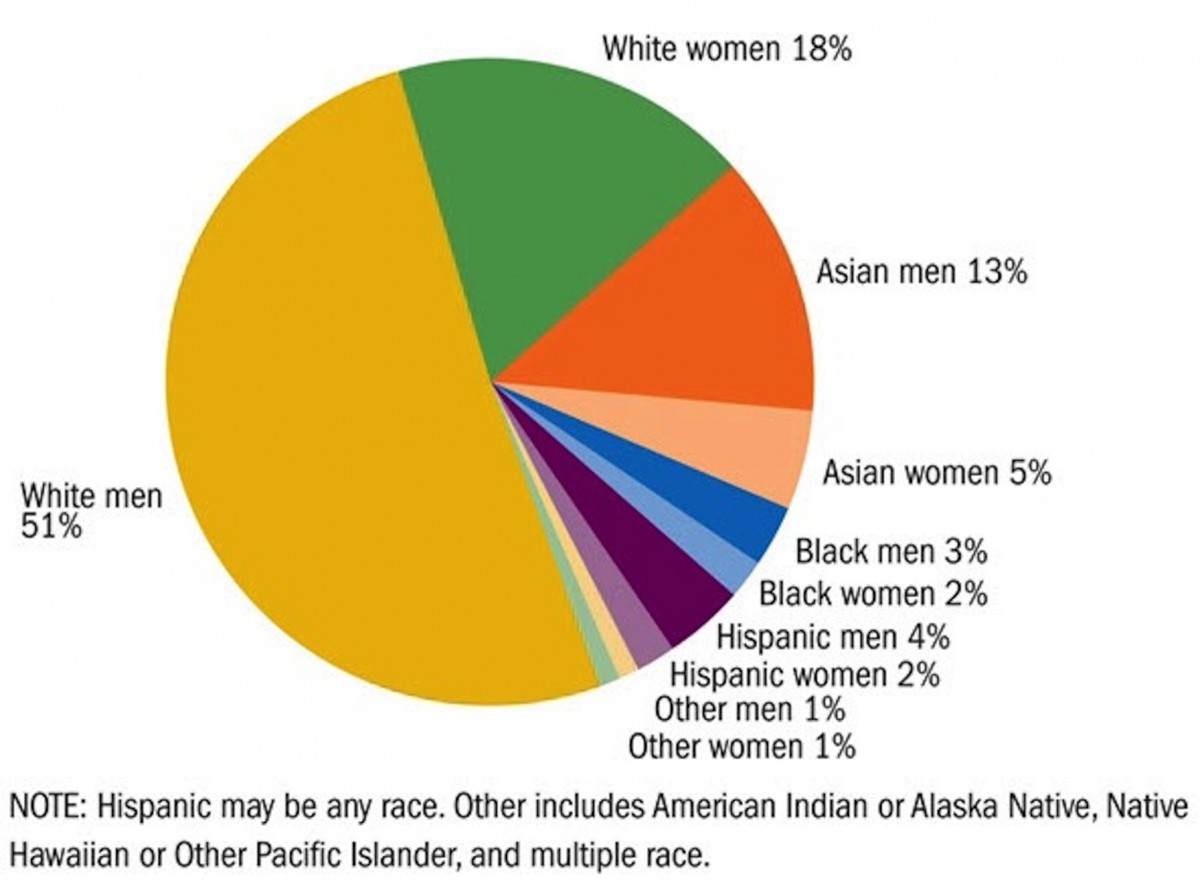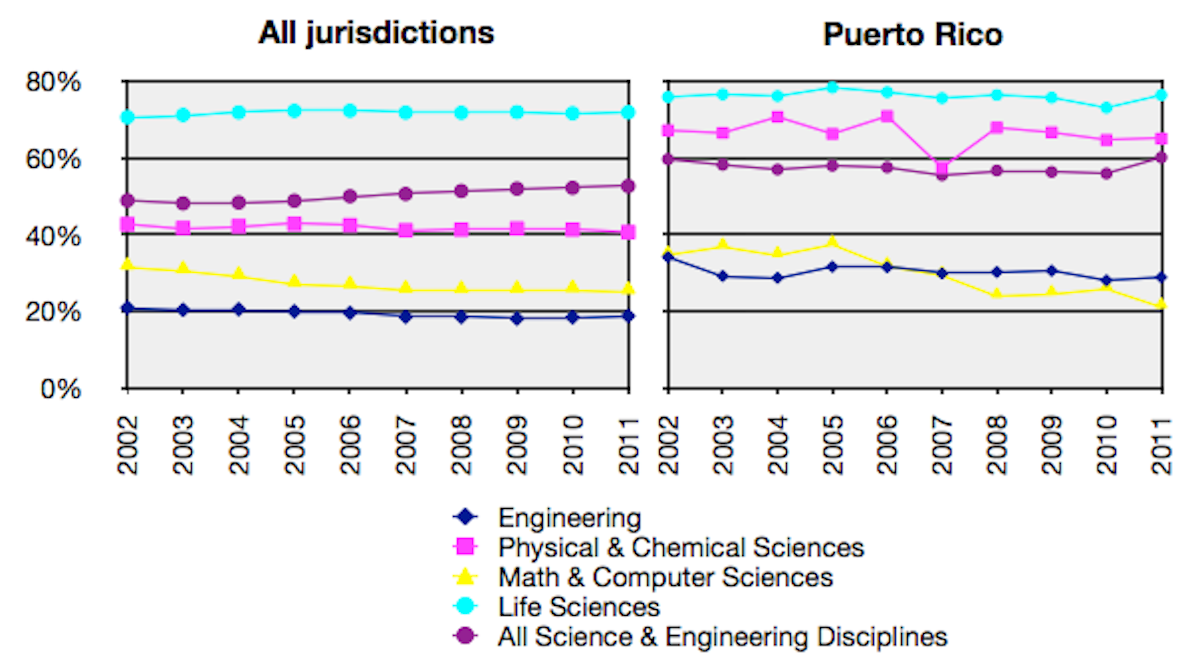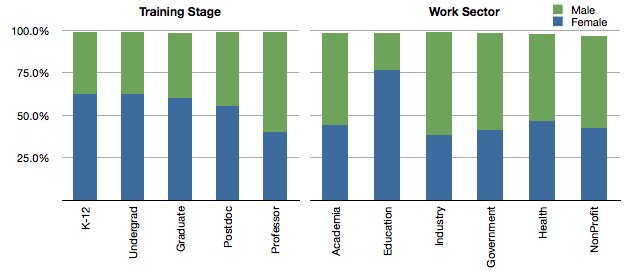Borinqueña : A new space for Puerto Rican and Hispanic women in science
Submitted by Giovanna Guerrero-Medina on
Almost 140 years have passed since famed Puerto Rican educator, philosopher, and lawyer, Eugenio Maria de Hostos, revolutionized Latin American intellectual spheres by publishing a passionate essay advocating for science education for women. Back in Hostos’ days, women still lacked the right to vote and few had access to any type of higher education.
Much has changed since that time. Women have made incredible progress in science in the last century. Today we work side by side with men as scientists and engineers; women lead math and physical science departments at major universities; and a visit to most college classrooms will show as many women as men eagerly enrolled in science courses.
But, a recent report by the National Science Foundation (NSF) shows that we still have some way to go. Despite being 50% of the labor force, women hold only 28% of science careers. The disparity is even more pronounced for Hispanic women, who comprise approximately 8% of the population in the United States, but account for only 2% of scientific careers.
 |
| People working as scientists and engineers in the U.S. (2010) Women, Minorities, and Persons with Disabilities in Science and Engineering: 2013, www.nsf.gov/statistics/wmpd |
Interestingly, in Puerto Rico, women show a higher interest in the sciences than in other U.S. jurisdictions, at least at the undergraduate level. According to data from the NSF and the Department of Education, approximately 60% of all bachelor's degrees in science and engineering from Puerto Rican institutions are awarded to women, compared to only 50% on average for the U.S. Even in typically male-dominated fields, like engineering, Puerto Rico graduates more women than most other states.
 |
|
Percentage of bachelors awarded to females in science & engineering in Puerto Rico (2002-2011) U.S. Department of Education, National Center for Education Statistics, Integrated Postsecondary Education Data System (IPEDS) Completion Survey, 2002-2011, Integrated Science and Engineering Resources Data System (WebCASPAR), https://webcaspar.nsf.gov[Data collected 09/09/2013] |
Puerto Rican women's interest in science is evident from the Ciencia Puerto Rico (CienciaPR) membership where women hold a slight majority (53%). However, if we break down our membership by academic trajectory and work sector, an interesting picture emerges. Despite being the majority of our members up to the postdoctoral level, women are significantly underrepresented at the faculty level. In fact, if the membership of CienciaPR is any indication (and we are almost 6,500 to date), Puerto Rican women are underrepresented in most professional science-related careers and sectors, except for K-12 education. Data collected in 2009 by the Puerto Rico Institute of Statistics and at least one study about the number of women professors in Engineering departments at the University of Puerto Rico, Mayagüez, support our findings—despite being a majority of science bachelors in Puerto Rico, women only occupy approximately 40% of all scientific positions in Puerto Rico.
 |
| CienciaPR members by gender, academic stage and work sector [Data recolectada 09/08/2013] |
This disparity between the number of women who train and specialize in science and the number who end up contributing to the workforce, represents a waste of talent, opportunity, and resources. In certain fields, like computer science, the lack of women in the labor sector can perpetuate stereotypes that prevent girls and young women from wanting to study these subjects in college and may even affect the types of products that are developed.
How can we change the situation?
The reasons for the underrepresentation of women in science careers are complex. A recent New York Times article did a very good job summarizing the range of social biases, workplace politics, and psychosocial issues that might be at play. However, several studies and reports coincide on four simple recommendations:
- Increase the visibility of successful professional female role models;
- Connect them with influential networks of advisors and mentors;
- Disseminate awareness about prevailing disparities related to women in science and common biases, prejudices and psychosocial hurdles; and
- Empower both men and women with tools and resources that will allow them to create change in their lives and institutions.
It is with these goals in mind that at CienciaPR we have decided to launch a new initiative for the support of Puerto Rican and Hispanic women in science.
Ciencia Puerto Rico is an organization that aims to promote education and scientific careers. We cannot succeed in this goal if half of our population does not have the same access to interesting and highly-remunerated scientific careers and to positions of leadership and visibility in the sciences.
Our new website section, called Borinqueña, will aim to highlight the contribution of Hispanic women in science and to provide a space to discuss issues of interest and empowerment for females. Twice a month, we will publish essays written by a dedicated group of borinqueñas that represent different academic stages, scientific disciplines, and professional experiences. We will also invite entries from male and female experts on issues related to women in science.
If you are interested in reading interviews with women working in scientific careers, stories of girls and young women who are passionate about science and technology, practical advice about common situations women face during the course of our careers, or recommendations and reviews of books, organizations and online resources, we invite you to follow us, share our essays, and contribute with yours!
With your help, Puerto Rico can once more be an example to other countries around the world in the empowerment of women in science.








